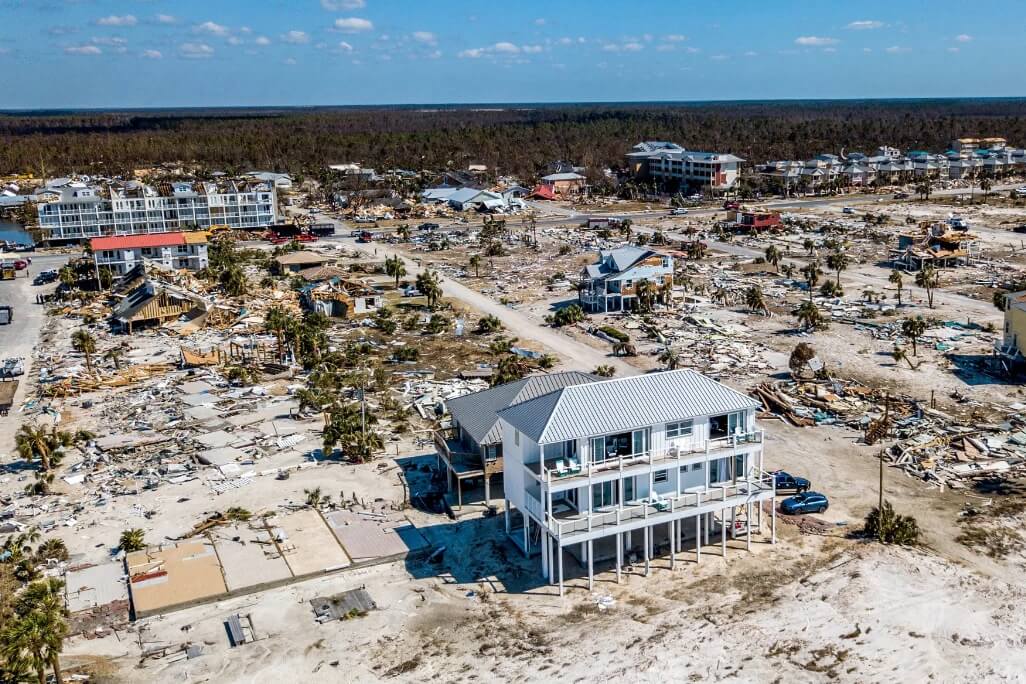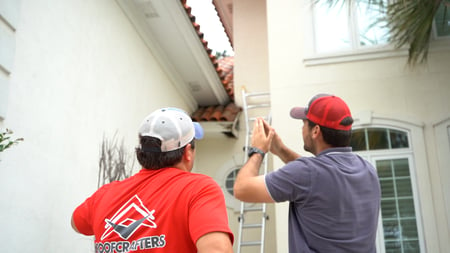Navigating Hurricane Ian Insurance Claims
September , 2024 | 6 min. read

Hurricane Ian left a trail of destruction in its wake when it made landfall on September 28, 2022. The storm’s impact was felt heavily across Florida, leaving countless homeowners with significant property damage and insurance claims. As recovery efforts continue, one critical issue remains at the forefront for many: ensuring that insurance claims are filed before the deadlines expire.
If you're still dealing with the aftermath of Hurricane Ian, RoofCrafters wants you to know that it's essential to understand the deadlines for filing claims. Missing these deadlines can result in claim denial, leaving you with costly repairs and no financial relief from your insurance company.
All of this being said, if you’re a homeowner who felt the effects of Ian, let's dive into what you need to know about filing deadlines, what types of claims you can file, and tips to maximize your claim. Off we go!
Understanding the Insurance Claim Filing Deadlines

Florida law is quite strict about how long policyholders have to file claims after a hurricane. For Hurricane Ian, the key date to remember is September 28, 2024. This deadline marks the end of the two-year window that policyholders have to file a new or reopened claim. If you miss this deadline, your insurance company can reject your claim, no matter how legitimate the damage.
For those who need to file a supplemental claim for additional damage discovered after the initial claim, the deadline is September 28, 2025. This gives you three years from the date of the hurricane to ensure that all losses have been accounted for, whether it's further damage uncovered during repairs or additional costs that were not initially covered.
It’s worth noting that Florida’s legislature passed some changes to the insurance laws in December 2022, but those amendments do not apply to Hurricane Ian's claims. The original two-year window remains in place for new claims, and the three-year window for supplemental claims still applies.
New Claims vs. Supplemental and Reopened Claims

There are three types of claims that policyholders need to be aware of:
New claims: This is for first-time filings. If you have not yet filed an insurance claim for damage caused by Hurricane Ian, the deadline for submitting this type of claim is September 28, 2024. The process includes notifying your insurer of the damage and starting the claims process.
Reopened claims: These are claims that were previously closed but require additional attention. For example, if your initial claim was underpaid or if you discover more damage that wasn’t included in the original claim, you can request to reopen it. This type of claim follows the same two-year deadline as new claims.
Supplemental claims: This type of claim is specifically for additional losses that were not included in the original claim or for costs incurred while completing repairs. You have until September 28, 2025, to file these claims, giving you extra time if more damage becomes apparent after the initial repair work starts.
The Importance of Filing On Time

Filing your claim before the deadline is not just a suggestion, it’s a requirement. If you don’t meet the deadline, you could face significant hurdles in recovering compensation from your insurance company. Insurers are under no legal obligation to honor claims filed after the deadline, which can leave you shouldering the full cost of repairs and rebuilding on your own.
Also, insurance companies have their own procedures for acknowledging and processing claims. Once you submit your claim, they have up to 14 days to acknowledge its receipt. From there, they must investigate and determine if the damage is covered under your policy.
Waiting until the last minute can complicate things. Insurance companies will likely be swamped with last-minute filings as the deadline approaches, which could delay processing times. It's also important to note that additional factors, such as legal disputes over claim denials or underpayment, can drag out the process further. Filing your claim early gives you the best chance of avoiding these complications.
Maximizing Your Insurance Claim

The aftermath of a hurricane is stressful enough without having to fight with your insurance company over what’s covered and what’s not. Here are some practical tips to help ensure that you get the compensation you’re entitled to:
Document Everything
One of the most important steps in the claims process is documenting all the damage. Take time-stamped photos and videos of everything, from damaged roofing to water-logged furniture. These records serve as critical evidence if your claim is ever disputed. If you’ve already started repairs, document that process as well.
Keep Track of Communication
Make sure to keep all correspondence between you and your insurance company, including emails, letters, and even notes from phone calls. This documentation can be crucial if any issues arise or if you need to escalate your claim through legal channels.
Understand Your Policy
Hurricane claims can be especially tricky because different policies may cover different types of damage. For example, your homeowner’s insurance may cover wind damage, but it might not cover flood damage, which could require separate flood insurance. Make sure you understand exactly what your policy covers and whether you’ll need to file separate claims for different types of damage.
Potential Challenges and Legal Assistance

Hurricane Ian's claims have been significant in volume, and some homeowners have reported issues such as underpayment or denied claims. If you find yourself in a situation where you disagree with your insurance company’s settlement offer, you do have the right to negotiate. However, this can be a challenging process, especially without expert help.
If your insurer is unwilling to pay a fair settlement, you may need to file a bad-faith lawsuit. This type of lawsuit alleges that the insurance company did not act in good faith when handling your claim. If successful, you could recover additional damages beyond what your policy originally covered.
Final Thoughts on Hurricane Ian Insurance Claims Process
As we all know, Hurricane Ian has left a lasting impact on Florida, but homeowners still have time to ensure they are financially protected. The key is to file your insurance claims as soon as possible and within the established deadlines.
Missing these deadlines can lead to costly consequences, so it’s essential to stay on top of your claim and, if necessary, seek legal help to get the compensation you deserve. Remember, for new or reopened claims, the deadline is September 28, 2024, and for supplemental claims, it’s September 28, 2025.
By following the best practices outlined here (documenting everything, filing early, and seeking expert help when needed), you’ll be in the best position to recover what you’re owed. If you’re seeking roofing assistance, but you’re not sure where to start, be sure to hit that “Schedule an Inspection” button down below!
My name is Cassie, and I’m the Content Manager here at RoofCrafters. I was born and raised in Chicago, Illinois, and made my way out to Florida post-college graduation. I’m incredibly passionate about writing and creating valuable content that helps others with the collaboration of my marketing team. When I’m not working, I enjoy shopping (a little too much), spending time at the beach, and reading!



